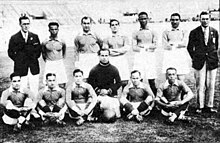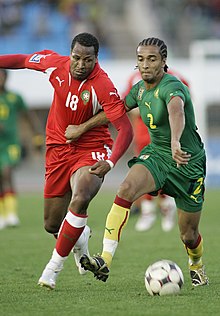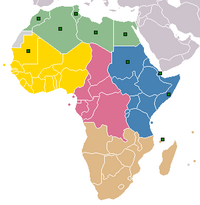Introduction
Football is the most popular sport in Africa. Indeed, football is probably the most popular sport in every African country, although rugby and cricket are also very popular in South Africa. (Full article...)

Selected article -

West African Football Academy (WAFA) Sporting Club is a Ghanaian professional football club based near Sogakope in the Volta Region that was founded by Feyenoord from Rotterdam. They are competing in the Ghana Premier League. The 2016–17 season was a successful one for WAFA as the side finished second in the Premier League, beating Hearts of Oak 5–0 along the way.
Selected biography -
Touré is known for combining passing ability and physical power with technique. A versatile player, he aspired to be a striker during his youth and has played centre back, including for FC Barcelona in the 2009 UEFA Champions League Final. He frequently plays as a box-to-box midfielder for club and country and often switches from defensive and offensive positions throughout matches. Touré began his playing career at Ivorian club ASEC Mimosas, where he made his debut aged 18. He was voted African Footballer of the Year for 2011, 2012 and 2013.
His performances attracted attention from Europe, playing for clubs in various European leagues. Touré played for Beveren in Belgium, Metalurh Donetsk in Ukraine, Olympiacos in Greece, and AS Monaco in France. In 2007, Touré moved to Barcelona, playing over 100 matches for the club and was part of the historic 2009 Barcelona team which won six trophies in one calendar year.
Yaya Touré then moved to Premier League club Manchester City in 2010, where he has since scored a number of key goals for the Citizens – most notably the only goals in the 2011 FA Cup semi-final and final. Touré has a distinguished international career with 82 caps for the Ivory Coast, representing the team in their first appearance in a FIFA World Cup, in the 2006 competition, and also played in the 2010 and 2014 tournaments. He is the younger brother of his Ivory Coast teammate Kolo Touré. They also played together at Manchester City for three years, before Kolo was transferred to Liverpool in 2013. Yaya himself left the club at the end of the 2017–18 season.
Selected image -
 |
Australian Footballers in Durban South Africa, 1900
Subcategories
Related portals
More sports portals
WikiProjects
Related task forces and sub-projects
African football task force
WikiProject Africa • WikiProject Football
WikiProject Football task forces and sub-projects
Topics
Open tasks

- Expand stubs: Competitions in Africa • Organizations
- Expand club articles of teams from Africa.
- Expand biographies of Africans involved in football.
- Create: Requested articles • Most wanted football articles • Requested general football articles
- Add: Infoboxes • Images (General requests, Requested images of people)
- Review: articles currently under review
- Assess: Assessment requests • Assess an article
- Revert vandalism on this portal and on African football articles
- Assist in maintaining this portal and keeping its selected content up to date.
- WikiNews: Create and submit news stories about African football for Wikipedia's sister project WikiNews.
Associated Wikimedia
The following Wikimedia Foundation sister projects provide more on this subject:
-
 Commons
Commons
Free media repository -
 Wikibooks
Wikibooks
Free textbooks and manuals -
 Wikidata
Wikidata
Free knowledge base -
 Wikinews
Wikinews
Free-content news -
 Wikiquote
Wikiquote
Collection of quotations -
 Wikisource
Wikisource
Free-content library -
 Wikiversity
Wikiversity
Free learning tools -
 Wiktionary
Wiktionary
Dictionary and thesaurus
More portals
Sources

- ^ "The History Of Soccer In Africa". NPR.org. 2010-06-09. Retrieved 2016-03-31.
- ^ a b c Alegi, Peter (2010). African Soccerscapes. Ohio University Press. pp. 1–2. ISBN 9780896802780.
- ^ Frimpong, Enoch Darfah. "Ghana news: A world of superstition, frustration and disillusionment - Graphic Online". Retrieved 23 September 2017.
- ^ Lacey, Marc (8 August 2002). "Kangemi Journal; For Spellbinding Soccer, the Juju Man's on the Ball". The New York Times. NY Times. Retrieved 2016-03-31.
- ^ "World Cup Witchcraft: Africa Teams Turn to Magic for Aid". National Geographic. Archived from the original on July 10, 2006. Retrieved 2016-03-31.
- ^ Andy Mitten (September 2010). The Rough Guide to Cult Football. Rough Guides UK. ISBN 9781405387965. Retrieved 2016-04-02.
- ^ "African Nations Cup overshadowed by hocus pocus | Football". The Guardian. Retrieved 2016-04-09.
- ^ Kuper, Simon (2006). Soccer Against the Enemy: How the World's Most Popular Sport Starts and Stops Wars, Fuels Revolutions, and Keeps Dictators in Power. Nation Books. p. 123. ISBN 978-1-56025-878-0.
















